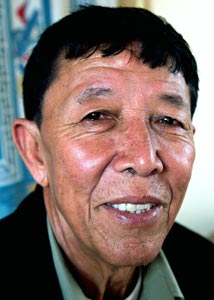Name: Sonam Dorjee
(Alias: No)
Gender: Male
Interview Age: 68
Date of Birth: 1939
Birthplace: Kham Chungpo, Kham, Tibet
Year Left Tibet: 1959
Profession: Monk
Monk/Nun: Previously
Political Prisoner: No

Interview No.: 86
Date: 2007-07-01
Language: Tibetan
Location: Lugsung Samdupling Settlement, Bylakuppe, Karnataka, India
Categories: Chinese Invasion and Occupation
Keywords: childhood memories, Chinese -- first appearance of, Chinese army -- invasion by , Chinese rule -- life under, education, escape experiences, Kham, March 10th Uprising, monastic life, refugee in India -- life as, resistance fighters
Summary:
Sonam Dorjee was born in Kham Chungpo to a family who engaged in both farming and a nomadic lifestyle. He and his family were very happy in independent Tibet; he recalls with emotion his childhood days in school and, later, as a monk in Sera Monastery in Lhasa.
Sonam Dorjee describes seeing Chinese soldiers bombard the Potala Palace and Sera Monastery. He also recalls the siege of Bakor and how the Chinese constantly announced on loud speakers that Tibet was "lagging behind" and that the Chinese had come "to help" the Tibetans.
After these events, the situation in Tibet deteriorated and Sonam Dorjee, along with a friend, fled the country. He relates in detail the hardships they suffered on their journey from Tibet. Once in India, Sonam Dorjee worked on road crews and then learned how to drive and repair cars. He saw many Tibetans die from the hot climate in India and suffer from leeches and mosquitoes.
Interview Team:
- Martin Newman (Interviewer)
- Lhakpa Tsering (Interpreter)
- Tsewang Dorjee (Videographer)

